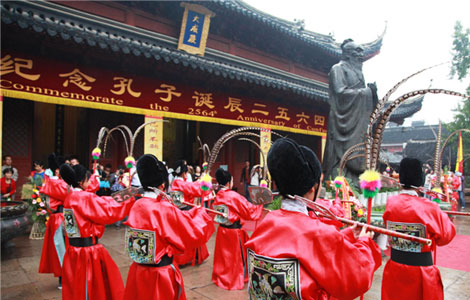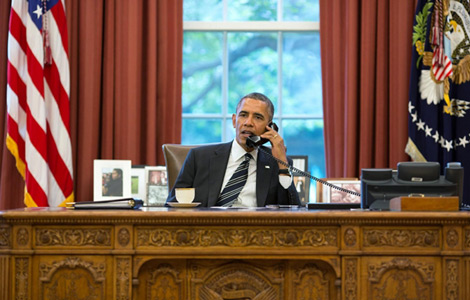Guideline doesn't curb online speech, experts say
Updated: 2013-09-28 07:04
(China Daily)
|
||||||||
The main targets of a judicial interpretation to fight online rumors are those fabricating and releasing false information and not Web users who forward it, legal experts say.
The tough measures unveiled by China’s top court and prosecutor earlier this month do not suppress citizens’ freedom of speech but can help protect their rights by taking advantage of the Internet to supervise, they added.
To define the criteria for convicting and sentencing off enders who spread rumors online, the Supreme People’s Court and the Supreme People’s Procuratorate issued a guideline on Sept 9.
Under the guideline, Internet users who share false information face upwards of three years in prison if online rumors they create are visited by 5,000 Internet users or reposted more than 500 times.
But the interpretation drew concerns that it may rein in the activity of social media and dampen the public fervor for unveiling online the corrupt activities of some officials.
On Thursday, Xinhua News Agency invited a number of law experts from the All China Lawyers Association, the top court and procuratorate, to give a correct understanding of the guideline, and tips on how regional law enforcers should use it.
According to Du Ximing, a judge at the top court, the Supreme People’s Court and the Supreme People’s Procuratorate have undertaken research into the correct interpretation for more than a year, studied a large number of cases and turned to judicial precedents for references.
“It is aimed at those fabricating and releasing the rumors, rather than people reposting them,” he said. Equal importance should be attached to fighting the rumor and protecting residents’ freedom of speech — and criticism — should not be suppressed.
Governments should seriously deal with the corruption exposed online or on micro blogs, actively check the information and make public their investigation results, he said.
If a Web user did not intend to fabricate information to defame others, he or she should not be subject to criminal prosecution, he added.
Zhou Saijun, deputy head of the Beijing Lawyers Association, said: “it is a serious misunderstanding” that the guideline will be used to suppress citizens’ freedom of speech.
The judicial interpretation draws clear lines of demarcation between what is a crime and what is not, confines judges’ discretion, and unifies the standards on handling cases. It is a tool for handling cases rather than for rendering control over the public, he said.
So the guideline will put a brake on online offenses while not harming freedom of speech or human rights, he added.
But in real practice, some regional law enforcers have been found misusing the interpretation, with the top court vowing to deliver better guidance on regional law enforcers and increasing their law enforcement abilities.
Gao Zicheng, co-founder of Beijing Kangda Law Firm, said differences of interpretation have been discovered during the implementation of the guideline.
In the latest alleged misuse of the interpretation, 16-year-old middle school student Yang Hui was detained on Sept 17 after he made an online post to protest the police’s handling of a man’s death earlier this month in Gansu province.
The teenager’s detention sparked a widespread outcry and provoked Internet users to uncover misconduct by the police. They eventually tracked down evidence to show Bai Yongqiang, director of public security for Zhangjiachuan Hui autonomous county, had paid up to 50,000 yuan ($8,170) in bribes to a corrupt official.
Bai was dismissed from his post on Sept 24. To prevent individual law enforcers and law enforcement departments from taking advantage of the goodwill guideline for improper purposes such as revenge, law enforcers should be required to increase their abilities, strictly abide by the law and be put under stricter supervision, Gao said.
- Chinese man detained for online bomb threat
- Being sensible online is important for parents
- Military official urges guidance of online views
- 'Like a online king' - celebrity blogger Xue's story
- Fighting online rumors will protect free speech
- Judicial move aims at online rumors
- Serious breach limit set for online rumors
- Police crack online pyramid schemes
- 'Top 10 online rumors' exposed

 American batman soars through Chinese mountain
American batman soars through Chinese mountain
 Kenya mourns victims of Westgate mall attack
Kenya mourns victims of Westgate mall attack
 Home schooling popular with Chinese parents
Home schooling popular with Chinese parents
 Royal Mint coins to mark Prince George christening
Royal Mint coins to mark Prince George christening
 29th Golden Rooster Awards
29th Golden Rooster Awards
 China marks birthday anniversary of Confucius
China marks birthday anniversary of Confucius
 Obama, Iran's Rouhani hold historic phone call
Obama, Iran's Rouhani hold historic phone call
 Li Na learns from her past
Li Na learns from her past
Most Viewed
Editor's Picks

|

|

|

|

|

|
Today's Top News
Special PLA medical squad starts service
US House votes to delay Obamacare
US spy agency mapped people's behavior -NYT
China won't seek hegemony, FM tells UN
China on yellow alert as Typhoon Wutip nears
Xi to visit attend APEC summit
East China cities debut 4G phones
Shanghai FTZ begins operation
US Weekly

|

|







